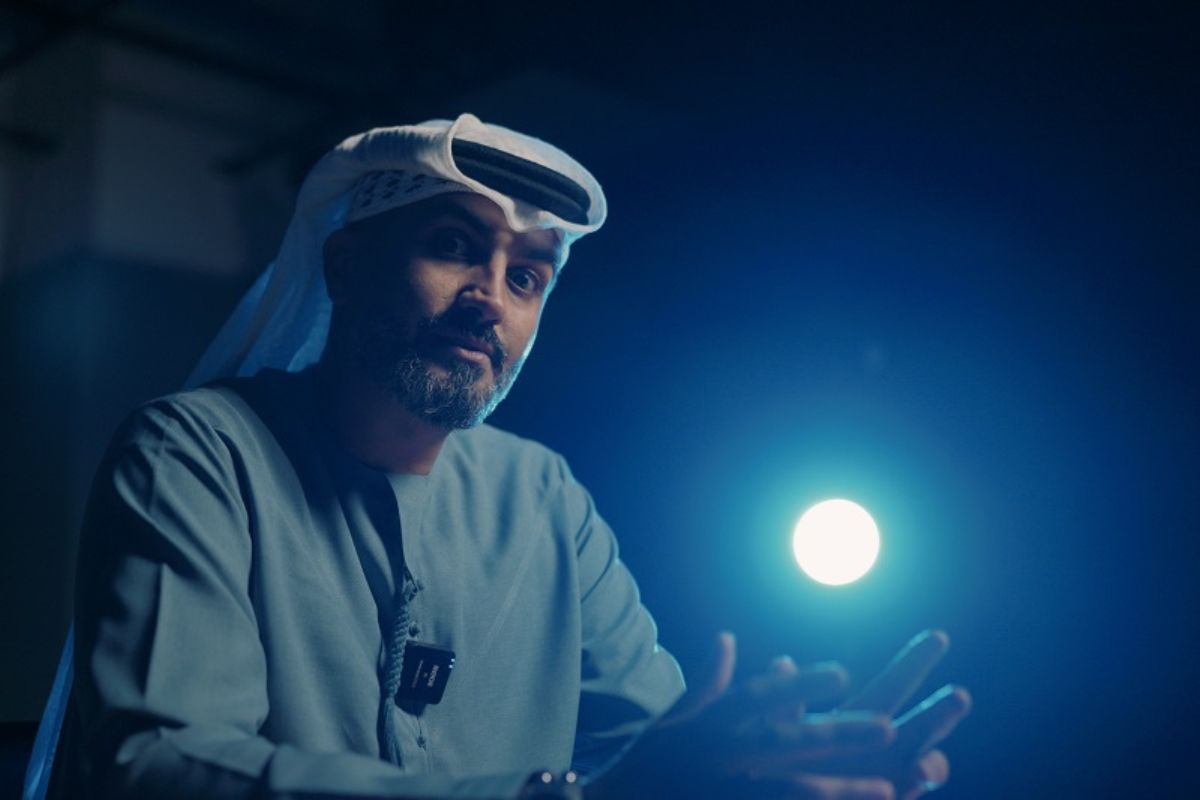
The team behind Hamour Doesn’t Leave the Cubicle shares their insights into the latest play coming to The Arts Center at NYU Abu Dhabi
What happens when workplace bureaucracy meets the bizarre? In Hamour Doesn’t Leave the Cubicle(هامور لا يغادر المكتب), an absurd Emirati play rooted in local culture yet universally relatable, audiences are invited to witness the humour and frustrations of bureaucratic life.
With scenes that range from the hilariously mundane to the wildly surreal – like holding a funeral for a pen – this satirical work challenges the very processes we take for granted in our daily grind.
Recently, we met with the Director Reem Almenhali and Playwright Ahmed Amadloum, a diversely skilled writer and journalist, to delve into their inspiration behind the play, which cleverly critiques real-world office inconveniences while using humour to shed light on the absurdities of bureaucracy.
Performed in Arabic with English subtitles, Hamour Doesn’t Leave the Cubicle offers both a laugh and a moment of reflection for anyone who’s ever battled red tape.
“The word ‘hamour’ is a type of fish but is used in Arabic to describe a person with significant influence in their field, which is reimagined to represent a bureaucratic manager,” says Ahmed, adding how the characters are named after various fish, symbolising different office roles and power dynamics.
“The play underwent four title changes and we were pleased when the UAE recently introduced an initiative to eliminate bureaucracy,” adds Reem. “Ahmed and I then decided to dedicate this production as a gift to everyone working hard to eliminate bureaucracy as part of this initiative.

The production team, including local and long-term resident actors, and artists as designers, collaborated to create a visually and thematically layered performance, re-imagining cultural references from this region in fresh, contemporary ways.
“It aims to be both culturally relevant and universally relatable, reflecting the mundane and extraordinary aspects of office life,” says Ahmed.
To ensure their critique of bureaucracy is delivered subtly yet effectively, the team behind Hamour Doesn’t Leave the Cubicle employed a multifaceted approach that blends absurdity with everyday office life.
Reem shared that the production design intentionally mirrors a typical workplace, but with quirky, absurd twists woven into the set, sound and other elements. “These subtle, humorous flourishes add layers of meaning, making the critique feel more nuanced and less overt,” she says.
You might also like: Explore theatre and true freedom with The Arts Center at NYU Abu Dhabi
Drawing from his own observations and conversations, he created characters and scenarios that are deeply relatable, grounding the critique in authenticity. Rather than confronting bureaucracy head-on, the team smartly narrows their focus to everyday annoyances – like the font size of an email or endless meetings – allowing for a quieter but still impactful message.
“The collaborative process, with input from actors, technicians, and others, also ensures that each layer of the play contributes to the underlying critique without overshadowing the humour, he says. “This balance between the mundane and the absurd lets the message land smoothly, while still keeping audiences entertained.”
While a reflection on the absurdities of workplace bureaucracy is at the helm of the play, empathy is another key element. By presenting relatable characters who struggle with the frustrations and futility of bureaucracy, Ahmed wants the audience to connect emotionally with their experiences.
“The blend of humour and critique allows viewers to laugh at the situations but also reflect on how similar frustrations may affect their own work lives. Through this empathy, the audience is prompted to reconsider the impact of bureaucracy on their well-being and productivity. Ultimately, Ahmed hopes that the humour in the play will inspire viewers to seek change in their own workplaces.
“By highlighting the absurdities and fostering empathy, the play opens the door to a deeper reflection on how bureaucratic processes can be streamlined or reformed,” he says. “The goal is for the audience to walk away not only entertained but also motivated to rethink and improve the systems that govern their work lives.

”Reem, who is an award-winning Emirati performance artist and theatre practitioner with a BA in Theater from NYU Abu Dhabi, was the creative director for A Tale To Every Nahma, a large-scale performance developed for Abu Dhabi’s Maritime Heritage Festival, blending historical research and traditional Gulf performing arts to honour the region’s maritime culture.
Reem also wrote and directed Deliberately and in Cash, a performance lecture on Diya money in the Gulf, and co-created with director Joanna Settle the bilingual contemporary theatre piece Al Raheel | Departure, exploring UAE life from women’s perspectives.
Al Raheel, which was collaboratively created with director Joanna Settle, earned her the prestigious 2020 Gulf Capital ADMAF Creativity Award.Final preparations for the upcoming play, premiering on Friday, 19 October, and Saturday, 20 October, have been intense.
“The team has been rehearsing rigorously, refining every aspect of the production,” says Reem. The script has undergone multiple revisions, with writer Ahmed merging his original text with new parallel storylines. “Feedback from the actors has been essential in ensuring the characters feel authentic,” he adds.
A dress rehearsal is planned to gather further input and make any last-minute adjustments.The play will debut at The Art Center at NYU Abu Dhabi, with plans for a UAE tour afterwards and potential expansion to other GCC countries. Both Reem and Ahmed are thrilled about the production’s unique take on bureaucracy.
“The collaborative process has been a labour of love, and the team is confident the play will captivate audiences and have a lasting impact,” says Reem.
For more information and to buy tickets, NYUAD Arts Center
Follow Yalla for more of Abu Dhabi arts and culture
